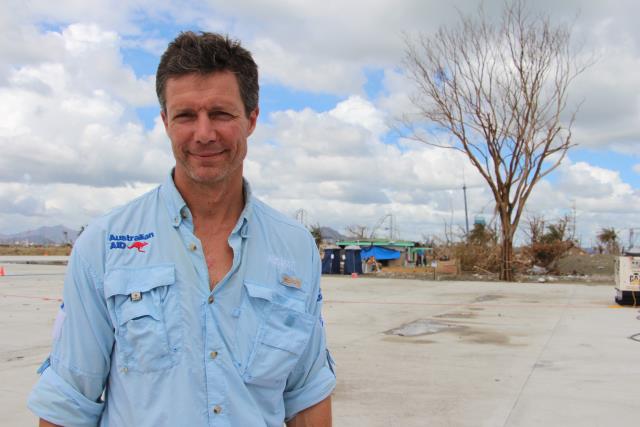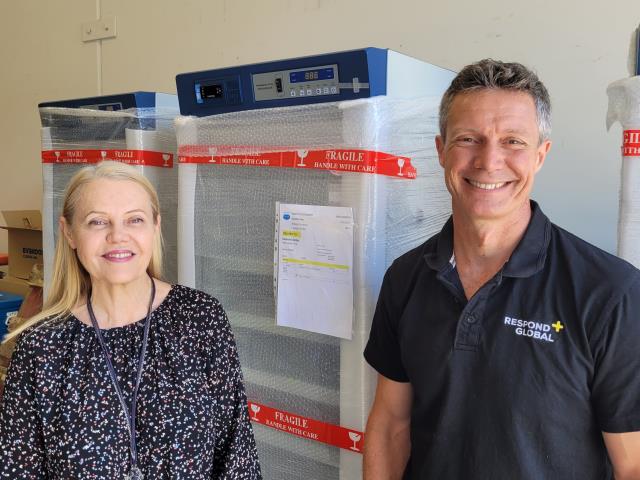As Queensland Health statistics show our shire’s Covid case numbers pass the 1000 mark, Noosa specialist emergency physician Dr Ian Norton said it was the simple public health measures combined with vaccination that would best protect people from the virus.
“We will all meet Covid – at the shops, sporting events or through someone we know. It’s a case of being double vaccinated, boosted and taking precautions to resist it,“ he said.
“The simple public health measures are valid – washing hands, physical distancing, mask wearing and disinfecting – all kill Omicron.“
With 20 years’ experience in emergency medicine across the world, including heading the World Health Organisation’s Emergency Medical Team (EMT) Initiative program and being deployed to an Ebola outbreak in West Africa, Dr Norton and his team at Respond Global have been at the forefront of Australia’s battle against Covid since the virus first emerged.
He has been called on to assist by federal, state and local governments. Respond Global came to the aid of the Ruby Princess when cruise ship sat off Sydney with crew and guests infected. When Victoria was hard hit in 2020, Dr Norton was called on to sort out an aged care sector in crisis, and during last year’s wave of Covid in NSW, the Federal Health Department asked Respond Global to conduct rapid tests in affected local government areas.
Locally Dr Norton has been collaborating with Noosa MP Sandy Bolton, Noosa Council and local business associations as well as working at Noosa Hospital’s emergency department.
With government rules ever shifting and soaring Covid numbers impacting businesses and the community, he spoke to Noosa Today to help clarify the situation.
“Covid has become a virus we are all going to be exposed to in some way but it’s not a virus we’re all going to get or want to get,” Dr Norton said.
“The virus is very transmissible. You don’t need four hours in the same house. If you’re exposed to someone for five, 10, 15 minutes – you can still be carrying it.
“You don’t have to be symptomatic to transmit it. You have a high risk of being a transmitter and being asymptomatic, particularly if you’re vaccinated.
“This is still a virus you can do without catching. There is still a risk of one in 100 people going to hospital and, if you have other health issues, the risk is very high.”
When asked if people were taking public health precautions, he said he hoped so but acknowledged people were jaded with lengthy restrictions, the confusion of ever-changing rules and a lack of easily accessible information from the government on how many people in the community have Covid.
“It’s definitely present in our community. There has been cases of spread in home settings and business settings, in all areas,” Dr Norton said.
“In Queensland and Noosa we were lucky not to have pre-existing outbreaks. Around the other states, they still have a Delta strain outbreak.
“We have about 80 per cent Omnicron, 20 per cent Delta. Four out of five cases are Omicron.
“With Delta strain, one in 10 people will be hospitalised. With Omnicron, one in 100 will need hospitalisation.
“The vaccines are still protection against serious illness and death.“
When Covid first appeared, its mode of transmission was unclear but studies have since shown it is mostly spread by droplets in the air.
“We’ve known for over a year Covid is aerosol-spread. That’s generally the dominant way of transmission,” Dr Norton said.
“Surface transmission is not as effective a way of transmitting the virus. We haven’t had to concentrate on surfaces. You won’t see playgrounds shutting. The virus doesn’t survive well on these surfaces.
“We know normal cleaning with disinfectant or bleach kills Covid very effectively. You don’t have to pay for deep clean.”
People who are positive with Covid are presenting at their GPs and hospital emergency departments or are queuing for a test.
What should people do if they think they have Covid?
“You don’t need to go to hospital unless you have shortness of breath. Don’t go to the GP or hospital to get a test,” Dr Norton said.
“Assume you have the virus, isolate, wear a mask, take precautions to stop its spread.
“Rapid Antigen Tests (RATs) will become available.
“You won’t go positive on a RAT straight away after exposure. It’s no use six hours later having a RAT. The average incubation is four days. You start to shed the virus in two days.
“The risk of developing the illness lasts up to 14 days.“
Dr Norton said it was hard to justify the government’s changing of the rules on isolation from 14 to seven days but suggested it was a compromise to allow more freedom.
“In general the graphs show after exposure days four, five and six are when you show signs of the virus. Most people turn positive on day four. Your chances of contracting the virus drop quite quickly by day seven. By day seven you’re around 90 per cent clear. After seven more days about 10 per cent of people will still become positive. After 14 days you’re 99.9 per cent clear.”
Dr Norton said Respond Global approached the State Government three months ago in an attempt to path the way for the use of RATs but were ignored.
“We’ve been doing this for more than a year. We wanted to set up guidance and protocols,“ he said.
“Through testing sites for people who have symptoms to get access to two tests handed out would be best.
“Protocols are the first part.“
In Noosa Respond Global has been collaborating with Noosa Council and business associations to put in place protocols, soon to be available, as a guidance on how to best use RATs to keep everybody safe.
“We’ve got to have clear protocols and clear messaging on how to get your hands on them,“ he said.
“We have a modest amount and are trying to get access to more to distribute them.
“We can’t be in a position to supply to individuals. We hope supply chains open up and the government starts to think about how to distribute to the public. They have to think of a way of reporting back.“
Council will be distributing the protocols through Tourism Noosa and business associations, he said.
Respond Global is also helping people in aged care with a Federal Government contract to make sure aged care support is available.
“RATs are being made available to these facilities from a national stockpile. We’re running that contract,“ he said.
Covid looks set to remain with us for some time yet.
Dr Norton said there was no evidence the virus was waning.
“Viruses don’t think – we’re going to be kind to humans. Everything that’s giving them a replicate advantage, they’ll take it,“ he said.
“The omicron peak still has a way to go. There’s no indication it will peter out. It can throw up a new variant that can be more dangerous.
“I expect a quiet March, April and to see another wave in winter. We should all be cautious.
“In the early days we had an open forum at the Sofitel. I was showing a graph of multiple waves for two to three years. People were scoffing at me. We still have a few more waves to go.”
“If there’s one thing Covid has taught us it’s to not predict what it will do next.“
For more, visit respond global.com







